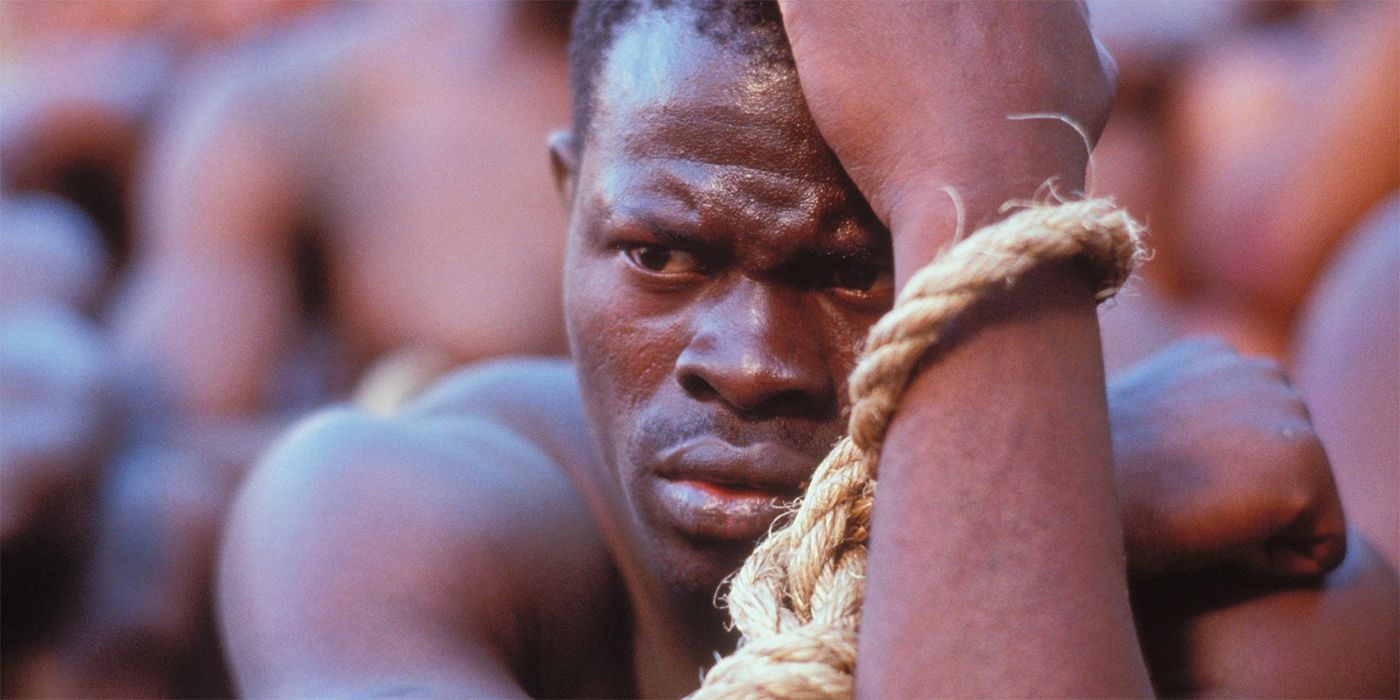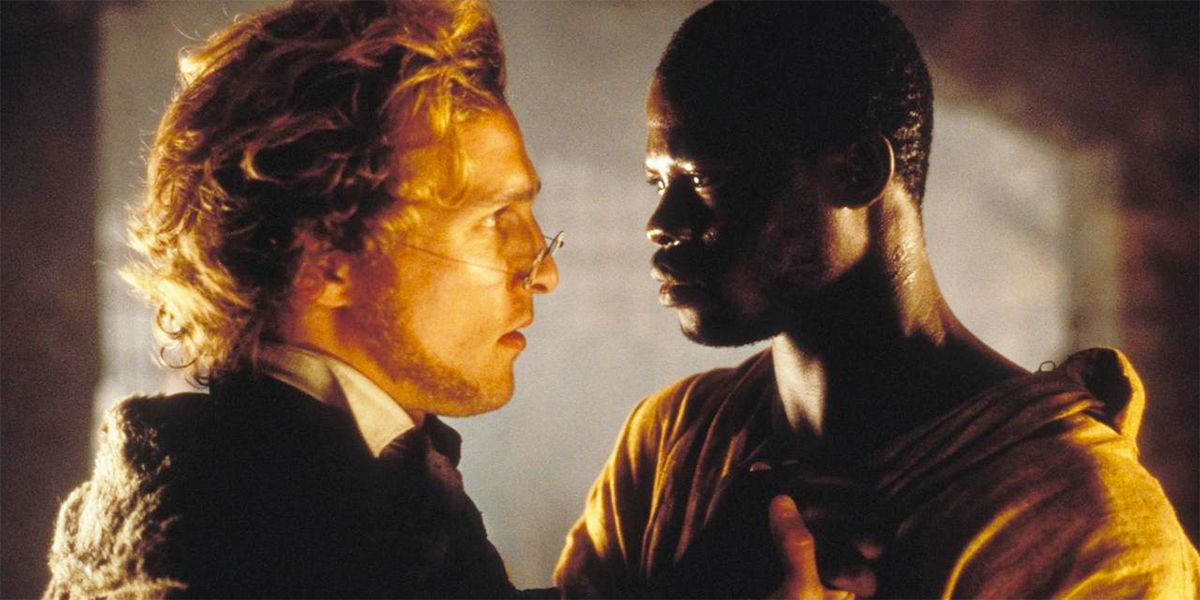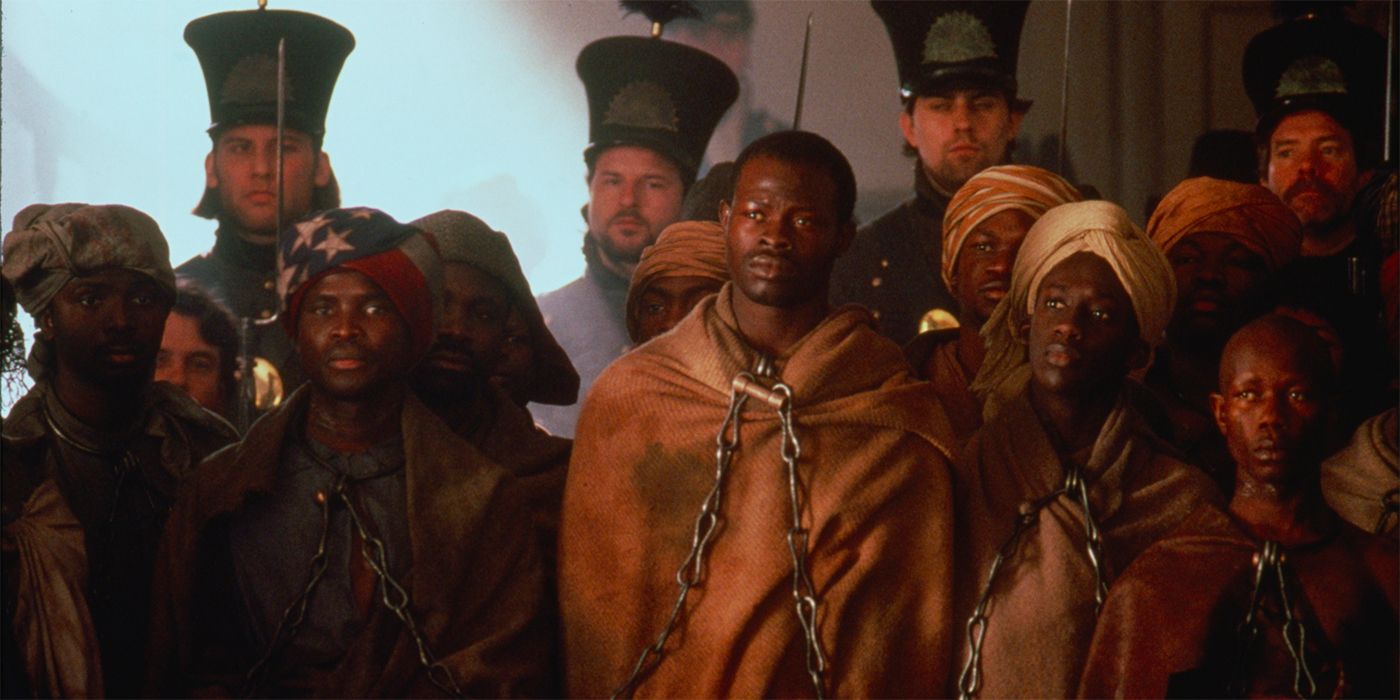When you think of the works of director Steven Spielberg, the films that will likely first come to mind are probably those like Jurassic Park or Jaws for how they hold up as thrilling blockbusters. However, it was the 1997 historical drama Amistad that, while it remains one of his most under-discussed, is also one of those films that has striking moments that is the director at his best even if the story is not. It is a work that, for all its flaws in its narrative framing and overstuffed approach, is still quite flooring in its simple moments. Even as it gets caught up in the legal drama that writer David Franzoni makes its central focus, there are some rather intriguing elements. It is more than a bit misguided in its prevailing approach, but it still discovers some moments of necessary cinematic clarity amidst the noisy plot.
This is most felt in the beginning when we are introduced to Cinqué, played by the consistently great Djimon Hounsou, who is being held aboard a ship transporting slaves off the coast of the Spanish colony of Cuba in 1839. It is a grim opening though takes a liberating turn, both cinematically and thematically, when he manages to free himself from his shackles. Under the cover of night with lightning crackling across the sky, Cinqué then leads an uprising by killing several of their captors and taking control of the ship.
It is a strong opening and makes for a compelling introduction that nothing else following it is able to quite match. Much of this comes from how the moment of freedom is short-lived as a betrayal by those they spare ends in their capture and imprisonment in America. We then get introduced to a whole host of other characters, historical and otherwise, who take part in an extended legal battle to free the slaves that have been brought there. Such focus feels off the mark, dodging what should've been the more interesting storyline for a far less interesting one dominated by legal elements.
At the center of this is a miscast Matthew McConaughey in one of his earliest roles as the lawyer Roger Sherman Baldwin who, wearing a goofy wig and glasses, will represent the captured men on behalf of abolitionists seeking to fight the barbaric institution of slavery. He is less driven by this cause and there are moments of the film that are skeptical of his approach including in one scene of translation where it is clear just how out of his depth he is.
The biggest problem comes down to how much we are following the story through his eyes. The way he treats the people he is representing feels more than a bit patronizing in ways that the film doesn’t have a handle on. Not only is he often bad at a job that is already hard enough, but he is the least significant character in the story yet becomes the one that the story often focuses on the most. He eventually does come to understand the importance of this case, but his journey of understanding is trite, especially when seen in the trajectory of similar stories that center on a white character coming to learn the horrors of the world that he remains immune to. It is just boring and the less time we spend with Baldwin, the better the film is.
Thankfully, the film does understand that its greatest asset remains in Hounsou as Cinqué. Not only is the actor a strong screen presence in the opening scene of the rebellion, but he manages to smuggle in some greater depth to the character in the quieter scenes even when he is pushed to the side. For all the structural problems that the film has in how it is conceived, is through his presence that everything becomes elevated. Every time he is on screen we lean in and are able to forget much of the meandering road it took to get back there to sit with him. The film smartly makes the pivot to make Cinqué a more active participant in the trial and speak in his own defense as opposed to merely being a bystander.
In these scenes, Hounsou shines as he brings life to a passion and rage that had been largely absent from the rest of the film. He is an understated performer who can shift into a mesmerizing monologue in the blink of an eye. In a memorial sequence of sorts that is also a protest when one of his fellow captives dies, there is no looking away from him and his ability to command the scene. While this should have more centrally been a story about Cinqué as opposed to the lawyers and corrupt leaders around him, what we do get ends up being riveting in ways that sneak up on you. The way Hounsou is able to push the story into the far deeper and more engaging emotional territory is a testament to the value of a good actor even in a less-than-perfect story.
There is an irony the film occasionally grapples with in how the case is primarily about whether Cinqué and the rest of the men were taken into slavery “legally” as opposed to under false pretenses. The question is not about truth or morality as it becomes clear that the rules can be rewritten at any time to suit those with an economic interest in continuing the exploitation. No matter how much the story seems slightly enamored with the legal institutions that the film centers on, the case was always about power and nothing else.
By the time Baldwin finally begins to mount a strong legal defense that seems like it will work, the prosecution conspires to replace the judge with a stooge they can more easily manipulate. It becomes clear that, no matter how much one has truth or morality on their side, those willing to work a human being to death will not be constrained by shamelessness or consistency. For all the ways the film is unwilling to focus on the most important parts of this story, the moments it sets its sights on the more honest and human moments draw us in.
Rating: B-



